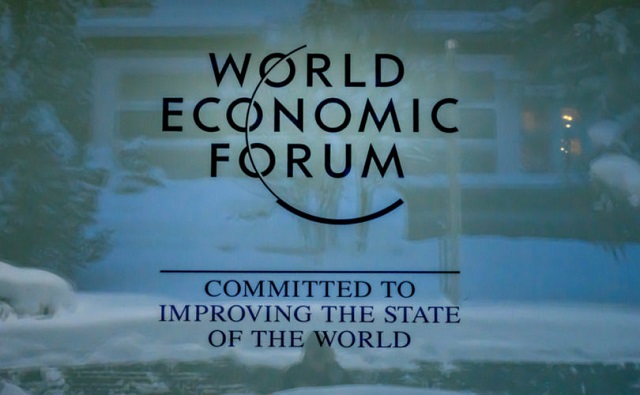Censorship Industrial Complex
World Economic Forum lists ‘disinformation’ and ‘climate change’ as most severe threats in 2024

From LifeSiteNews
By Joe Kovacs
The World Economic Forum’s Global Risks Report 2024 says the world is ‘plagued by a duo of dangerous crises: climate and conflict,’ which are ‘set against a backdrop of rapidly accelerating technological change and economic uncertainty.’
The World Economic Forum, the group of global elites whom those on the political right love to hate, has just issued its report on the biggest threats in 2024 and beyond.
And at the top of its list of risks is not the climate, at least not immediately.
The WEF, based in Davos, Switzerland, says the biggest short-term risk stems from fake news.
“While climate-related risks remain a dominant theme, the threat from misinformation and disinformation is identified as the most severe short-term threat in the 2024 report,” the group indicated.
“The cascading shocks that have beset the world in recent years are proving intractable. War and conflict, polarized politics, a continuing cost-of-living crisis and the ever-increasing impacts of a changing climate are destabilizing the global order.”
“The report reveals a world ‘plagued by a duo of dangerous crises: climate and conflict.’ These threats are set against a backdrop of rapidly accelerating technological change and economic uncertainty.”
The globalists say “the growing concern about misinformation and disinformation is in large part driven by the potential for AI, in the hands of bad actors, to flood global information systems with false narratives.”

The report states that over the next two years, “foreign and domestic actors alike will leverage misinformation and disinformation to widen societal and political divides.”
It indicates the threat is enhanced by large elections with more than 3 billion people heading to the polls in 2024 and 2025 in the U.S., Britain, and India.
The report suggests the spread of mis- and disinformation could result in civil unrest, but could also drive government-driven censorship, domestic propaganda and controls on the free flow of information.
Rounding out the top ten risks for the next two years are: extreme weather events, societal polarization, cyber insecurity, interstate armed conflict, lack of economic opportunity, inflation, involuntary migration, economic downturn and pollution.
The ten-year list of risks puts extreme weather events at No. 1, followed by critical change to Earth systems, biodiversity loss and economic collapse, natural resource shortages, misinformation and disinformation, adverse outcomes of AI technologies, involuntary migration, cyber insecurity, societal polarization and pollution.
Reprinted with permission from the WND News Center.
Business
Telegram founder Pavel Durov exposes crackdown on digital privacy in Tucker Carlson interview

From LifeSiteNews
By Robert Jones
Durov, who was detained in France in 2024, believes governments are seeking to dismantle personal freedoms.
Tucker Carlson has interviewed Telegram founder Pavel Durov, who remains under judicial restrictions in France nearly a year after a surprise arrest left him in solitary confinement for four days — without contact with his family, legal clarity, or access to his phone.
Durov, a Russian-born tech executive now based in Dubai, had arrived in Paris for a short tourist visit. Upon landing, he was arrested and accused of complicity in crimes committed by Telegram users — despite no evidence of personal wrongdoing and no prior contact from French authorities on the matter.
In the interview, Durov said Telegram has always complied with valid legal requests for IP addresses and other data, but that France never submitted any such requests — unlike other EU states.
Telegram has surpassed a billion users and over $500 million in profit without selling user data, and has notably refused to create government “backdoors” to its encryption. That refusal, Durov believes, may have triggered the incident.
READ: Arrest of Telegram founder Pavel Durov signals an increasing threat to digital freedom
French prosecutors issued public statements, an unusual move, at the time of his arrest, fueling speculation that the move was meant to send a message.
At present, Durov remains under “judicial supervision,” which limits his movement and business operations.
Carlson noted the irony of Durov’s situating by calling to mind that he was not arrested by Russian President Vladimir Putin but rather a Western democracy.
Former President of Russia Dmitry Medvedev has said that Durov should have stayed in Russia, and that he was mistaken in thinking that he would not have to cooperate with foreign security services.
Durov told Carlson that mandates for encryption “backdoors” endanger all users, not just suspects. Once created, such tools inevitably become accessible to hackers, foreign agents, and hostile regimes.
“In the US,” he commented, “you have a process that allows the government to actually force any engineer in any tech company to implement a backdoor and not tell anyone about it.”
READ: Does anyone believe Emmanuel Macron’s claim that Pavel Durov’s arrest was not political?
Durov also pointed to a recent French bill — which was ultimately defeated in the National Assembly — that would have required platforms to break encryptions on demand. A similar EU proposal is now under discussion, he noted.
Despite the persecution, Durov remains committed to Telegram’s model. “We monetize in ways that are consistent with our values,” he told Carlson. “We monetized without violating privacy.”
There is no clear timeline for a resolution of Durov’s case, which has raised serious questions about digital privacy, online freedom, and the limits of compliance for tech companies in the 21st century.
Censorship Industrial Complex
Alberta senator wants to revive lapsed Trudeau internet censorship bill

From LifeSiteNews
Senator Kristopher Wells and other senators are ‘interested’ in reviving the controversial Online Harms Act legislation that was abandoned after the election call.
A recent Trudeau-appointed Canadian senator said that he and other “interested senators” want the current Liberal government of Prime Minister Mark Carney to revive a controversial Trudeau-era internet censorship bill that lapsed.
Kristopher Wells, appointed by former Prime Minister Justin Trudeau last year as a senator from Alberta, made the comments about reviving an internet censorship bill recently in the Senate.
“In the last Parliament, the government proposed important changes to the Criminal Code of Canada designed to strengthen penalties for hate crime offences,” he said of Bill C-63 that lapsed earlier this year after the federal election was called.
Bill C-63, or the Online Harms Act, was put forth under the guise of protecting children from exploitation online.
While protecting children is indeed a duty of the state, the bill included several measures that targeted vaguely defined “hate speech” infractions involving race, gender, and religion, among other categories. The proposal was thus blasted by many legal experts.
The Online Harms Act would have in essence censored legal internet content that the government thought “likely to foment detestation or vilification of an individual or group.” It would be up to the Canadian Human Rights Commission to investigate complaints.
Wells said that “Bill C-63 did not come to a vote in the other place and in the dying days of the last Parliament the government signaled it would be prioritizing other aspects of the bill.”
“I believe Canada must get tougher on hate and send a clear and unequivocal message that hate and extremism will never be tolerated in this country no matter who it targets,” he said.
Carney, as reported by LifeSiteNews, vowed to continue in Trudeau’s footsteps, promising even more legislation to crack down on lawful internet content.
Before the April 28 election call, the Liberals were pushing Bill C-63.
Wells asked if the current Carney government remains “committed to tabling legislation that will amend the Criminal Code as proposed in the previous Bill C-63 and will it commit to working with interested senators and community stakeholders to make the changes needed to ensure this important legislation is passed?”
Seasoned Senator Marc Gold replied that he is not in “a position to speculate” on whether a new bill would be brought forward.
Before Bill C-63, a similar law, Bill C-36, lapsed in 2021 due to that year’s general election.
As noted by LifeSiteNews, Wells has in the past advocated for closing Christian schools that refuse to violate their religious principles by accepting so-called Gay-Straight Alliance Clubs and spearheaded so-called “conversion therapy bans.”
Other internet censorship bills that have become law have yet to be fully implemented.
Last month, LifeSiteNews reported that former Minister of Environment Steven Guilbeault, known for his radical climate views, will be the person in charge of implementing Bill C-11, a controversial bill passed in 2023 that aims to censor legal internet content in Canada.
-

 Business21 hours ago
Business21 hours agoCarney’s European pivot could quietly reshape Canada’s sovereignty
-

 Alberta20 hours ago
Alberta20 hours agoAlberta’s grand bargain with Canada includes a new pipeline to Prince Rupert
-

 Crime1 day ago
Crime1 day agoManhunt on for suspect in shooting deaths of Minnesota House speaker, husband
-

 Bruce Dowbiggin5 hours ago
Bruce Dowbiggin5 hours agoWOKE NBA Stars Seems Natural For CDN Advertisers. Why Won’t They Bite?
-

 Crime5 hours ago
Crime5 hours agoMinnesota shooter arrested after 48-hour manhunt
-

 Energy5 hours ago
Energy5 hours agoCould the G7 Summit in Alberta be a historic moment for Canadian energy?
-

 Aristotle Foundation3 hours ago
Aristotle Foundation3 hours agoThe Canadian Medical Association’s inexplicable stance on pediatric gender medicine
-

 conflict6 hours ago
conflict6 hours ago“Evacuate”: Netanyahu Warns Tehran as Israel Expands Strikes on Iran’s Military Command



